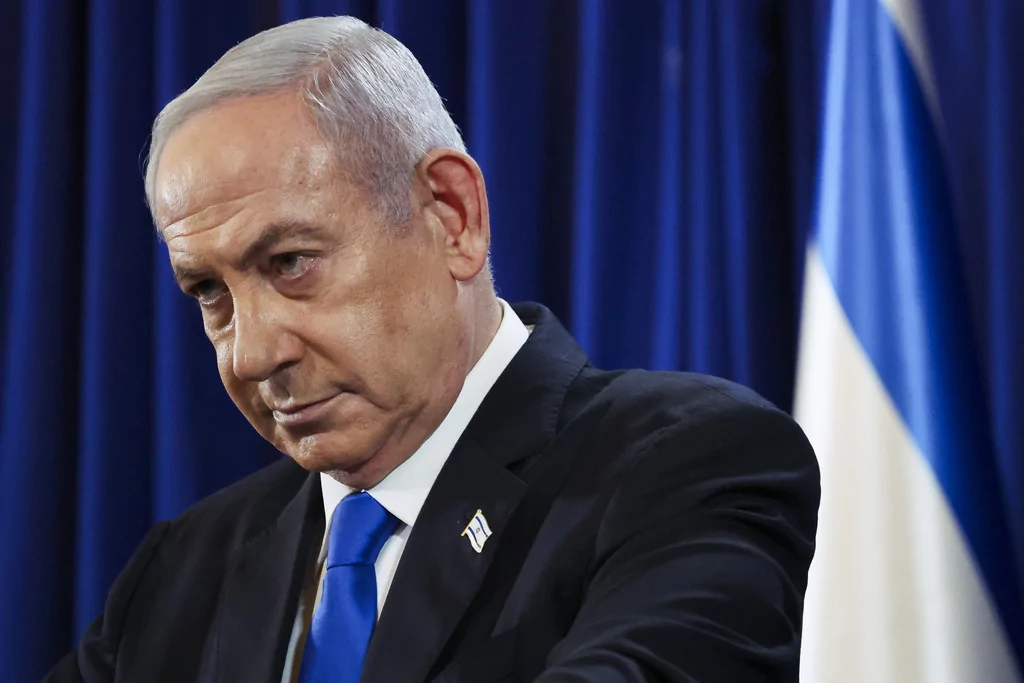
Israeli Prime Minister Benjamin Netanyahu invoked the attempted assassination of former President Donald Trump as a preview of a potential attack on himself, a complaint that is fueling a political uproar in Israel.
“It can happen because there is incitement to violence and murder of elected officials, of ministers, of the prime minister, of his family,” Netanyahu told an Israeli broadcaster on Monday. “No one is doing anything about it.”
Netanyahu took the allegation to the airwaves one day after a Cabinet meeting in which his team played “a video of a collection of calls to incitement against the prime minister,” according to his office. That compilation set the stage for Netanyahu to accuse the attorney general of tolerating threats of violence from protesters against his management of the ceasefire-and-hostage-release negotiations as widespread anxiety and anger over the fate of the hostages seized by Hamas fuels a political uproar that can feed even on a failed attack on an American presidential candidate in Pennsylvania.
“It’s the issue of the hostages that are really bringing things to a boiling point in Israel,” Foundation for Defense of Democracy Senior Director Enia Krivine, an Israel-based analyst, told the Washington Examiner. “This issue being so raw and so visceral within Israel … [Netanyahu] is kind of being [perceived] as the guy that is intentionally causing these deals to fail.”
Netanyahu’s relationship with the attorney general is marred further by a series of disputes connected to an attempt by Netanyahu’s allies to alter the balance of power between the Israeli Supreme Court and the legislature, as well as a long-running corruption inquiry.
“Netanyahu and his supporters, feel that the left has been inciting against them, precisely as Trump and Trump supporters feel that the left here has been inciting against him,” Hudson Institute senior fellow Michael Doran told the Washington Examiner. “If you’re a Netanyahu supporter, then you [also] believe that the judicial establishment, in all respects, has been weaponized against Netanyahu…And so, the parallel with Trump also is perfect there [with respect to] the sense among Trump and his supporters is that the judicial system has been weaponized against Trump.”

Netanyahu made clear references to pro-ceasefire protesters who have taken to the streets to demand a deal to release the hostages — “It is permitted to block highways with fire,” he fumed — in a rebuke of the attorney general.
“Political murder is being normalized here,” Netanyahu said. “The incident that occurred in the U.S., many said the writing was on the wall. We are seeing the writing on the wall. We are seeing the writing in the squares. We are seeing the writing on social media. We all see it.”
Those complaints cut little ice with his political rivals, who accused Netanyahu of exploiting the attack on Trump for a self-serving stunt.
“I … condemn any incitement, but here is a sentence that is not incitement: Netanyahu is a whiny, bad, and failed prime minister, who is only concerned with himself and his personal affairs, and he should go home,” Israeli opposition leader Yair Lapid, a center-left politician who orchestrated the coalition government that interrupted Netanyahu’s tenure as prime minister from 2021-2022, said Monday.
The contretemps resonates through layers of contemporary and historical disputes, analysts say. Israeli society is haunted by the 1995 assassination of Prime Minister Itzhak Rabin, the Labor Party politician who agreed to the 1993 Oslo Accords with the Palestine Liberation Organization, by a hard-right opponent of the deal. The murder took place just weeks after activists attacked Rabin’s car — an anecdote that has returned to the surface of contemporary controversies given that a young Itamar Ben Gvir, now the controversial Israeli national security minister — boasted at the time that “we can get to Rabin.”
“There’s been a lot of sort of calls to violence thrown around by the left and by the right,” Krivine said. “It’s not [as if] either side in this country has monopoly on that. … What’s particularly painful right now is the hostage families and the fact that these negotiations have become political. So these families are blaming Netanyahu.”
That controversy has festered throughout months of negotiations with Hamas, although U.S. officials have faulted the terrorist group for refusing to accept Israeli offers. And yet, Netanyahu also reportedly has shifted his position in the latest talks — in an attempt “to use Hamas’ weakness to get as much as he can out of the negotiations,” an Israeli official told Axios — and a rift appears to be widening between Netanyahu and other security leaders.
“Now it is [possible], so I’m telling you: It’s closer than it has ever been. There is complete unanimity in the defense establishment — the IDF, the Shin Bet, and the Mossad — that there is no insurmountable security obstacle to the deal from their point of view,” Israeli Defense Minister Yoav Gallant reportedly told relatives of hostages. “It is critical to move ahead with decisions in the near future. It’s important to finalize the processes in the coming days, before the prime minister’s trip to Washington or in the course of his visit. After that, it will be much more difficult and complicated.”
CLICK HERE TO READ MORE FROM THE WASHINGTON EXAMINER
Such disagreements bring some hair-raising prospects into view in a deeply divided political society, according to Krivine.
“The fact that people are connecting sort of directly Netanyahu needing to be pressured in order to bring the hostages home does kind of set up some uncomfortable conversations about the potential use of violence against Netanyahu,” the FDD expert said.




